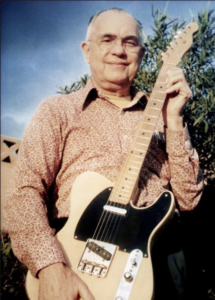Choosing today’s Dead of the Day was easy. Leo Fender was arguably one of the most important figures in the history of rock and roll. And he couldn’t play a note.
What Fender did was invent the Telecaster, the first mass-produced electric guitar, in 1950. The genesis for the guitar came from the radio repair service he opened in Fullerton.  California, after WWII. A popular spot for musicians, the store made and maintained public address systems used for concerts in the Southern California area. There was also a call for amplifiers for their acoustic guitars. Players complained complained those guitars were fragile, tough to keep in tune, and had trouble being heard over the band, and Fender, along with Rickenbacker designer Clayton Kauffman, set about creating a guitar that suited their needs. First called the Esquire, then the Broadcaster, and, finally, the Telecaster. The guitar’s iconic shape (the body was cut from a single slab of wood), its two Fender-patented pick-ups and bolt-on neck, the Telecaster provided players with the
California, after WWII. A popular spot for musicians, the store made and maintained public address systems used for concerts in the Southern California area. There was also a call for amplifiers for their acoustic guitars. Players complained complained those guitars were fragile, tough to keep in tune, and had trouble being heard over the band, and Fender, along with Rickenbacker designer Clayton Kauffman, set about creating a guitar that suited their needs. First called the Esquire, then the Broadcaster, and, finally, the Telecaster. The guitar’s iconic shape (the body was cut from a single slab of wood), its two Fender-patented pick-ups and bolt-on neck, the Telecaster provided players with the  bright, hard-edged tone that was perfect for twangy country lead guitar. It was a hit from the start, and followed in short order by the Precision Bass—the first electric bass—the iconic, streamlined, space-aged Stratocaster in 1954, and a line of amplifiers still prized today for their warm tone and rich distortion. The Fender Twin remains one of the most most popular amps.
bright, hard-edged tone that was perfect for twangy country lead guitar. It was a hit from the start, and followed in short order by the Precision Bass—the first electric bass—the iconic, streamlined, space-aged Stratocaster in 1954, and a line of amplifiers still prized today for their warm tone and rich distortion. The Fender Twin remains one of the most most popular amps.
Battling health problems, Fender sold his company to CBS in 1965, but that wasn’t the end of his career. He started the Music Man and G & L instrument companies. While not as recognizable at the Tele or Strat, they were successful and are still manufactured today.

Here’s a short playlist of Fender guitars on record. We open with The Johnny Burnette Rock and Roll Trio, featuring Paul Burlison on lead, one of the earliest records made with the new guitar. His distorted tone was an accident; his amp was dropped loading into the studio, and one of the tubes loosened, giving the instrument a distinctive fuzz. Next up is Buck Owens and the Buckaroos’ instrumental hit, “Buckaroo,” featuring Buck and his great lead guitarist, Don Rich. Next up, the Beatles, who were big Buck Owens fans (they had a hit with his “Act Naturally”), and put the sustain and sharp sound of the Tele to memorable use on “Ticket To Ride.” Fender guitars made their mark in Soul music; Steve Cropper, a member of the M.G..s, was a fan of the Fender Guitars, and his runs are one of the pleasures of Otis Redding’s “Scratch My Back.” Finally, Jeff Beck, one of rock’s most distinctive stylists, a master of the instrument’s tone, and indelibly identified with Fender Guitars, making hay with Willie Dixon’s hit for Holwin’ Wolf, “I Ain’t Superstitious.”
Others who passed today include actress and Warhol “Superstar” Candy Darling (1974), baseball Hall Of Famer and member of the St. Louis Cardinals “Gashouse Gang”,” Joe “Ducky” Medwick (1975), and TV host Chuck Barris (2017).

Leave a Reply